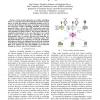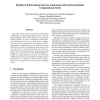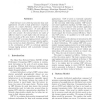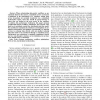124
click to vote
CCGRID
2008
IEEE
15 years 2 months ago
2008
IEEE
In this paper, we describe the design and implementation of two mechanisms for fault-tolerance and recovery for complex scientific workflows on computational grids. We present our ...
117
click to vote
CCGRID
2008
IEEE
15 years 4 months ago
2008
IEEE
In the current approaches to workflow scheduling, there is no cooperation between the distributed workflow brokers and as a result, the problem of conflicting schedules occur. To o...
145
click to vote
CCGRID
2008
IEEE
15 years 4 months ago
2008
IEEE
Abstract--The current trend in high performance computing is to aggregate ever larger numbers of processing and interconnection elements in order to achieve desired levels of compu...
143
click to vote
CCGRID
2008
IEEE
15 years 4 months ago
2008
IEEE
This paper examines the job exchange between parallel compute sites in a decentralized Grid scenario. Here, the local scheduling system remains untouched and continues normal oper...
151
click to vote
CCGRID
2008
IEEE
15 years 4 months ago
2008
IEEE
Production grids are complex and highly variable systems whose behavior is not well understood and difficult to anticipate. The goal of this study is to estimate the impact of the ...
133
click to vote
CCGRID
2008
IEEE
15 years 4 months ago
2008
IEEE
Fault tolerance is one of the key issues for large scale applications executed on high performance computing systems. In a cluster federation, clusters are gathered to provide hug...
115
click to vote
CCGRID
2008
IEEE
15 years 4 months ago
2008
IEEE
Prefetching is an effective technique for improving file access performance, which can reduce access latency for I/O systems. In distributed storage system, prefetching for metadat...
117
click to vote
CCGRID
2008
IEEE
15 years 4 months ago
2008
IEEE
When orchestrating data-centric workflows as are commonly found in the sciences, centralised servers can become a bottleneck to the performance of a workflow; output from service i...
116
click to vote
CCGRID
2008
IEEE
15 years 4 months ago
2008
IEEE
This paper presents the design and implementation of a new file system independent collective I/O optimization based on file views: view-based collective I/O. View-based collective...





